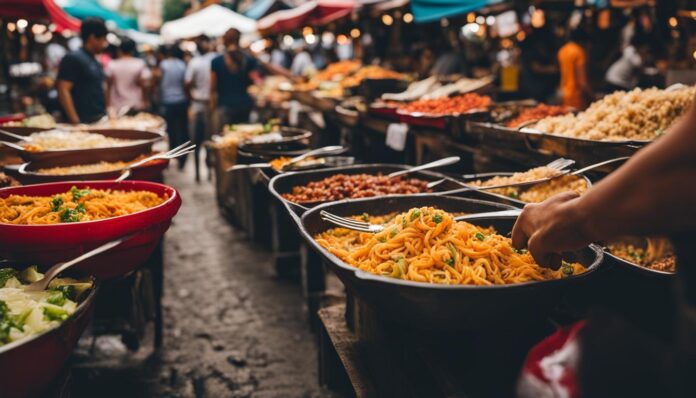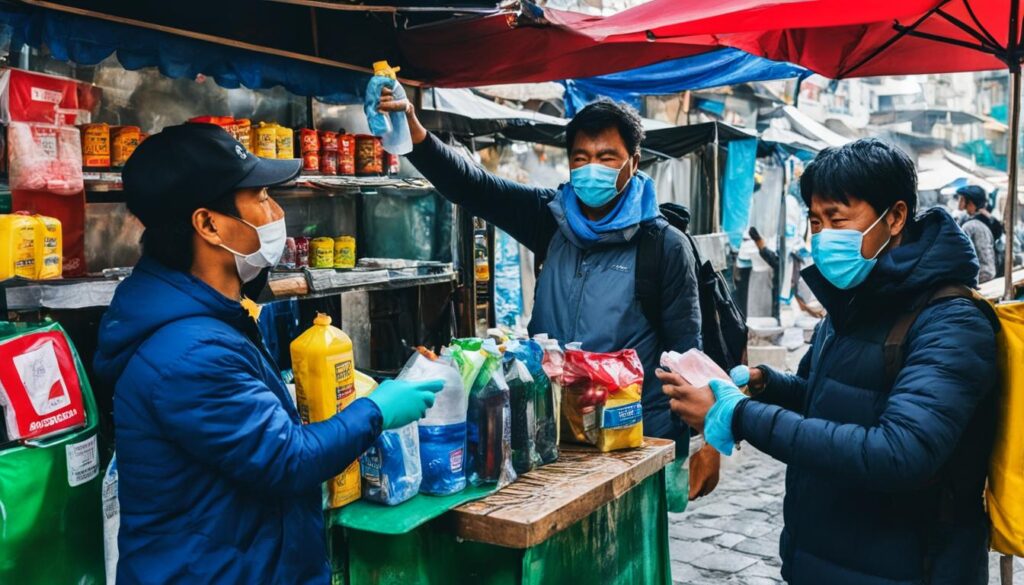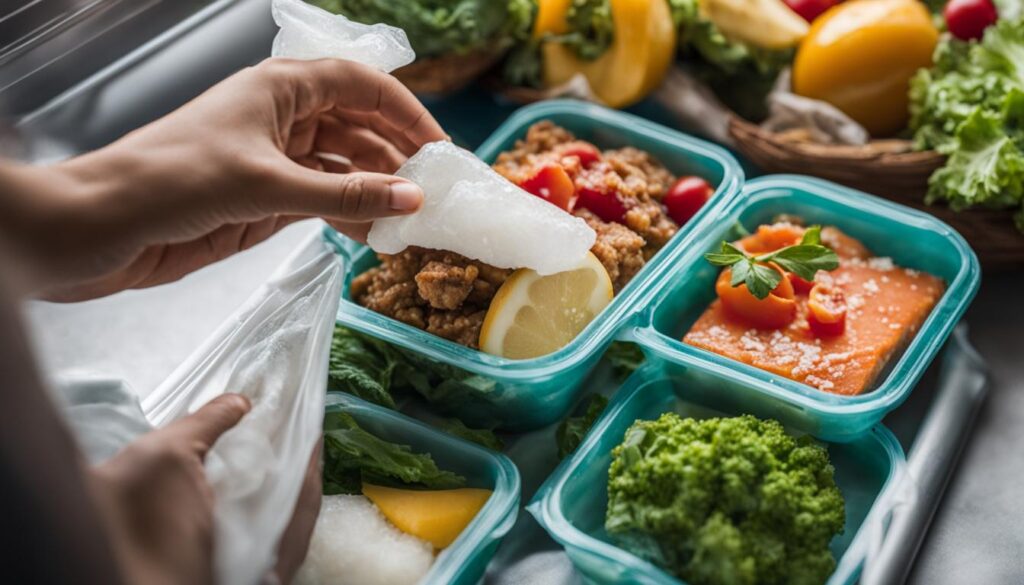If you’re an avid traveler, you know that one of the greatest joys of exploring new destinations is trying local cuisine. However, indulging in exotic dishes also comes with a risk of catching foodborne illnesses. Nothing ruins a trip faster than spending your days in bed, feeling miserable and sick.
The good news is that there are several steps you can take to protect yourself from foodborne illnesses while traveling. In this section, we will provide you with essential food safety tips to ensure your health stays intact and you enjoy your trip to the fullest. So, let’s dive in and explore how you can avoid foodborne illnesses while traveling.
Understanding Foodborne Illnesses
Before you hit the road, it’s crucial to understand how foodborne illnesses can affect your health while traveling. Food poisoning is caused by eating contaminated food or drinking contaminated water or beverages. The symptoms include diarrhea, vomiting, fever, abdominal cramps, and dehydration. In severe cases, it can even lead to hospitalization or death.
Food contamination can happen in many ways, including:
- Improper storage and handling of food
- Unwashed hands of food handlers
- Cross-contamination, i.e., using the same equipment or utensils to prepare different types of foods
- Consuming undercooked or raw foods
While foodborne illnesses can happen anywhere, the risk increases when traveling, as you may encounter new foods, preparation methods, and unfamiliar dining establishments. It is essential to be aware of the risks and take necessary precautions to protect your health.
Common Foodborne Diseases
Some of the most common foodborne diseases that travelers may encounter on the road include:
| Disease | Symptoms | Duration |
|---|---|---|
| Salmonella | Diarrhea, fever, abdominal cramps | 4-7 days |
| E. coli | Diarrhea, abdominal pain, nausea | 5-10 days |
| Norovirus | Diarrhea, vomiting, nausea | 1-3 days |
| Hepatitis A | Fever, fatigue, loss of appetite, abdominal pain, jaundice | 2 weeks-3 months |
Image Below Illustrates different types of foodborne diseases people usually may find:
Preventing foodborne illnesses is possible with proper planning, good food hygiene, and smart choices when it comes to eating while traveling. Keep reading to learn how to stay safe and healthy on the road.
Research and Plan Ahead
When planning your trip, it’s essential to research the local cuisine and dining options to ensure safe eating practices while traveling. This way, you can make informed decisions about where to eat, reducing the risk of foodborne illnesses. Here are some tips to help you plan ahead:
- Look for reputable dining establishments: Before your trip, research the recommended restaurants and culinary experiences in the area. Check online reviews and ask locals for suggestions. Choose reputable dining establishments with high cleanliness standards and a good track record of safe food preparation.
- Pack portable snacks: Bringing along your own healthy snacks is a great way to stay fueled and avoid eating risky food options. Pack non-perishable snacks such as trail mix, protein bars, and dried fruit, and avoid eating street food or other questionable options.
- Bring a water bottle: Staying hydrated is important, especially when temperatures rise. Bring a water bottle and ensure you fill it up with safe water sources. If tap water is not safe to drink, look for alternatives such as bottled water, filtered water, or boiled water.
Another helpful tip is to research the local cuisine and traditional dishes before your trip. This way, you can get an idea of what dishes to look for and what ingredients to avoid. For example, in some countries, street food may be a common and safe option, while in others, it may carry a higher risk of contamination.
| Do: | Don’t: |
|---|---|
| Choose restaurants with high cleanliness standards | Eat at establishments with poor reviews or low cleanliness standards |
| Pack portable, non-perishable snacks | Eat street food, especially if you’re unsure of its safety |
| Research local cuisine and traditional dishes before your trip | Eat dishes that contain raw or undercooked meats or seafood |
Remember to always prioritize your health and safety while traveling by following these healthy eating guidelines for travelers. By taking the time to research and plan your meals ahead, you can minimize the risk of foodborne illnesses and enjoy your trip to the fullest.
Stay Hydrated and Wash Hands Frequently
When it comes to food safety, maintaining good hygiene is crucial. By staying hydrated and washing your hands frequently, you can minimize the risk of contamination and protect your health while traveling. This is especially important for tourists, who may be exposed to unfamiliar food and water sources.
Dehydration can affect your body’s ability to fight off bacteria and viruses, so it’s important to drink plenty of fluids while traveling. Be sure to carry a reusable water bottle with you, and refill it with safe, potable water. If you’re unsure about the safety of the tap water, consider purchasing bottled water instead.
Handwashing is another essential practice for preventing the spread of germs and bacteria. Always wash your hands with soap and water for at least 20 seconds before handling food, after using the bathroom, and after touching objects or surfaces that may be contaminated. You can also use an alcohol-based hand sanitizer if soap and water are not available.
By staying hydrated and practicing proper hand hygiene, you can reduce your risk of foodborne illnesses and stay healthy while dining abroad. Don’t underestimate the importance of these simple practices for safeguarding your health!
Choose Safe Dining Establishments
One of the best ways to prevent food poisoning during vacations or while dining out is to choose safe dining establishments. Not all restaurants and food vendors maintain the same standards of hygiene, and it is important to be extra careful while away from home. Here are some tips for selecting safe dining options:
- Read online reviews: before visiting a restaurant or food vendor, consider reading online reviews to see what others have to say about their hygiene standards and food safety practices.
- Observe cleanliness: take a quick look around the establishment upon arrival. Does it appear clean and well-maintained? Are staff members practicing proper hygiene, such as wearing gloves or washing their hands frequently?
- Inspect food: take a close look at the food before ordering. Does it look fresh and properly cooked? Is it being stored at the correct temperature?
- Choose busy places: restaurants that are busy with lots of customers are a good sign that their food is popular, and therefore they are likely changing their ingredients and food frequently.
By taking these precautions and being extra careful when dining out, you can reduce the chances of getting food poisoning during your travels.
Be Aware of Local Water and Ice
When traveling, it’s essential to be mindful of the water and ice you consume, as some destinations may not have safe tap water. To avoid foodborne illnesses while traveling, stick to safe drinking options such as bottled water and boiled or treated water. Make sure the bottled water you purchase has the seal intact and is from a reputable brand. Avoid ice made from tap water and opt for ice made from treated or boiled water.
Additionally, be cautious when consuming fresh produce that may have been washed in contaminated water. Peel fruits and vegetables or wash them thoroughly with safe water and let them dry before consumption.
“Consuming contaminated water and ice can be a major source of foodborne illnesses during travel. Sticking to safe drinking options and being cautious with fresh produce can minimize the risks.”
Handle and Store Food Properly
Proper food handling and storage are crucial for maintaining food safety while traveling. Whether you’re purchasing groceries or packing snacks for the road, follow these essential tips to minimize the risk of foodborne illnesses:
- Wash your hands: Before handling any food, wash your hands thoroughly with soap and water for at least 20 seconds. This will remove any harmful bacteria and reduce the risk of contamination.
- Separate raw and cooked foods: Raw foods should be kept separate from cooked foods to avoid cross-contamination. Store them in different containers or bags, and use different utensils for handling them.
- Use proper storage containers: Make sure to use airtight containers or resealable bags to prevent the spread of bacteria. This will also keep your food fresh for longer.
- Keep food at the right temperature: Perishable foods should be kept in a cooler with ice or frozen gel packs to maintain a safe temperature. This is especially important when transporting meats, dairy products, and other foods that spoil easily.
- Avoid raw or undercooked foods: When purchasing food, avoid raw or undercooked meat, seafood, and eggs. These foods can contain harmful bacteria that can cause foodborne illnesses.
By following these food safety tips for travelers, you can ensure that your food remains safe and healthy. Remember to always wash your hands, separate raw and cooked foods, use proper storage containers, keep food at the right temperature, and avoid raw or undercooked foods.
Be Cautious with Street Food
Exploring local cuisine is an essential part of traveling; however, street food can be a potential source of foodborne illnesses. To minimize the risks of contamination, ensure that you follow these healthy eating guidelines for travelers:
- Choose stalls that are busy, popular, and have a high turnover of food.
- Ensure that the food you order is cooked fresh and served hot.
- Avoid raw or undercooked meats and seafood.
- Watch the vendor prepare your food and avoid stalls where the hygiene conditions are questionable.
- Carry hand sanitizer with you and use it before and after eating.
Street food can be both delicious and safe when you make informed choices. Remember to trust your instincts; if something looks or smells off, it’s better to skip it. By being diligent and following healthy eating guidelines for travelers, you can enjoy a memorable culinary experience without compromising your food safety.
Cook Your Food Thoroughly
If you’re cooking your own meals while traveling, it’s essential to follow proper cooking techniques and temperatures to avoid foodborne illnesses. Undercooked food can harbor harmful bacteria, leading to illnesses that could ruin your vacation.
Here are some food hygiene tips for tourists to prevent food poisoning during vacations:
| Food Type | Safe Minimum Internal Temperature |
|---|---|
| Beef, pork, veal, lamb (roasts, steaks, chops) | 145°F (63°C) |
| Ground meats (beef, pork, veal, lamb, turkey, chicken) | 160°F (71°C) |
| Poultry (chicken, turkey, duck, goose) | 165°F (74°C) |
| Seafood | 145°F (63°C) |
In addition to following the safe internal temperature guidelines, here are some other tips to help you cook your food thoroughly:
- Use a thermometer to check the temperature of the food. Don’t rely on the color or texture of the meat to determine if it’s cooked.
- Cut into the thickest part of the meat to ensure it’s cooked all the way through.
- Cook ground meat until no pink remains, and juices run clear.
- When reheating leftovers, make sure they reach an internal temperature of 165°F (74°C).
By cooking your food thoroughly and following safe cooking practices, you can enjoy delicious, safe meals during your travels.
Pack a Travel Health Kit
When traveling, a well-prepared travel health kit is essential to ensure your well-being and quick recovery from minor ailments. Here’s what to pack:
| Item | Purpose |
|---|---|
| Prescription Medications | To manage pre-existing medical conditions and maintain regular medication schedules |
| First Aid Kit | To treat minor cuts, scrapes, and injuries |
| Hand Sanitizer | To maintain hand hygiene and prevent the spread of germs |
| Water Purification Tablets | To ensure safe drinking water in areas with questionable water quality |
| Anti-Diarrhea Medication | To ease symptoms of food poisoning and diarrhea |
| Insect Repellent | To prevent insect bites and reduce the risk of vector-borne diseases |
By packing a thorough travel health kit, you can address minor health concerns quickly and effectively, reducing the chance of aggravating the issue and ruining your trip. Remember to check expiration dates and replace any expired medications or supplies before your trip.
Additionally, it’s a good idea to carry the prescription of all the medication in case you lose them or run out.
Remember, staying healthy while dining abroad and avoiding food poisoning during vacations should be a priority. Your well-being is key to a successful trip.
Trust Your Instincts and Seek Medical Help if Needed
Despite your best efforts, sometimes foodborne illnesses can still occur while traveling. If you experience symptoms such as nausea, vomiting, diarrhea, or fever, it’s essential to listen to your body and seek medical help immediately to avoid further complications.
Don’t ignore mild symptoms, as they can quickly escalate into severe dehydration or other serious health issues.
If you suspect you have contracted a foodborne illness, contact your hotel reception or tour operator for assistance. They can provide you with information on nearby healthcare facilities or help you schedule a medical consultation.
While seeking medical help, remember to stay hydrated and get plenty of rest to support your recovery.
“Don’t let a foodborne illness ruin your well-deserved vacation. Stay aware of your body’s signals and seek medical help promptly.”
Common Symptoms of Foodborne Illnesses
The symptoms of foodborne illnesses can vary depending on the type of infection. However, some common signs to watch out for include:
- Abdominal pain and cramping
- Nausea and vomiting
- Diarrhea
- Fever and chills
- Dehydration
If you experience any of these symptoms, contact a healthcare professional immediately.
Conclusion
Traveling can be an exciting and enriching experience, but it’s important to prioritize your health and safety while on the road. By following these safe travel tips and practicing good food hygiene, you can minimize the risk of foodborne illnesses while enjoying the local cuisine.
Remember to research and plan your meals ahead, stay hydrated, wash your hands frequently, and choose safe dining establishments. Be cautious with street food, and cook your food thoroughly if you’re cooking your own meals. Pack a travel health kit and seek medical help if needed.
By taking these precautions, you can reduce the risk of contracting a foodborne illness, ensuring that your trip is a memorable and enjoyable experience. Bon voyage!

















































